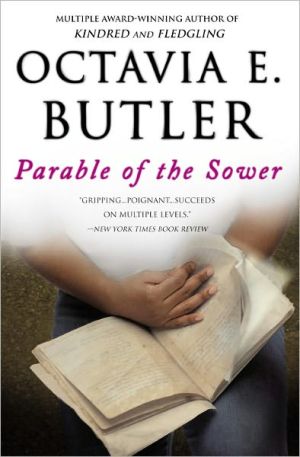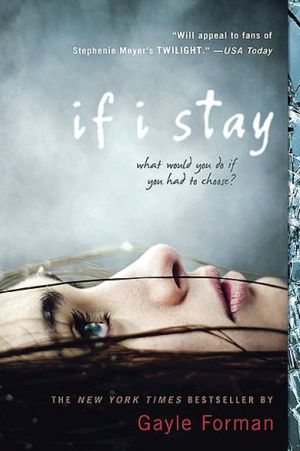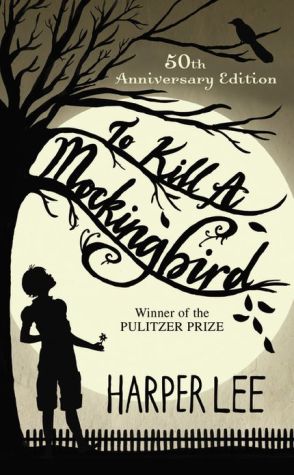Parable of the Sower
When unattended environmental and economic crises lead to social chaos, not even gated communities are safe. In a night of fire and death Lauren Olamina, a minister's young daughter, loses her family and home and ventures out into the unprotected American landscape. But what begins as a flight for survival soon leads to something much more: a startling vision of human destiny... and the birth of a new faith.\ \ \ A stirring portrait of 21st-century America by the...
Search in google:
When unattended environmental and economic crises lead to social chaos, not even gated communities are safe. In a night of fire and death Lauren Olamina, a minister's young daughter, loses her family and home and ventures out into the unprotected American landscape. But what begins as a flight for survival soon leads to something much more: a startling vision of human destiny... and the birth of a new faith.Publishers WeeklyHugo and Nebula Award-winner Butler's first novel since 1989's Imago offers an uncommonly sensitive rendering of a very common SF scenario: by 2025, global warming, pollution, racial and ethnic tensions and other ills have precipitated a worldwide decline. In the Los Angeles area, small beleaguered communities of the still-employed hide behind makeshift walls from hordes of desperate homeless scavengers and violent pyromaniac addicts known as ``paints'' who, with water and work growing scarcer, have become increasingly aggressive. Lauren Olamina, a young black woman, flees when the paints overrun her community, heading north with thousands of other refugees seeking a better life. Lauren suffers from `hyperempathy,'' a genetic condition that causes her to experience the pain of others as viscerally as her own--a heavy liability in this future world of cruelty and hunger. But she dreams of a better world, and with her philosophy/religion, Earthseed, she hopes to found an enclave which will weather the tough times and which may one day help carry humans to the stars. Butler tells her story with unusual warmth, sensitivity, honesty and grace; though science fiction readers will recognize this future Earth, Lauren Olamina and her vision make this novel stand out like a tree amid saplings. (Dec.)
\ \ \ \ Chapter One\ All that you touch\ You Change.\ All that you Change\ Changes you.\ The only lasting truth\ Is Change.\ God Is Change.\ —Earthseed: The Books of the Living\ \ \ SATURDAY, JULY 20, 2024\ I had my recurring dream last night. I guess I should have expected it. It comes to me when I struggle—when I twist on my own personal hook and try to pretend that nothing unusual is happening. It comes to me when I try to be my father's daughter.\ Today is our birthday—my fifteenth and my father's fifty-fifth. Tomorrow, I'll try to please him—him and the community and God. So last night, I dreamed a reminder that it's all a lie. I think I need to write about the dream because this particular lie bothers me so much.\ \ \ I'm learning to fly, to levitate myself. No one is teaching me. I'm just learning on my own, little by little, dream lesson by dream lesson. Not a very subtle image, but a persistent one. I've had many lessons, and I'm better at flying than I used to be. I trust my ability more now, but I'm still afraid. I can't quite control my directions yet.\ I lean forward toward the doorway. It's a doorway like the one between my room and the hall. It seems to be a long way from me, but I lean toward it. Holding my body stiff and tense, I let go of whatever I'm grasping, whatever has kept me from rising or falling so far. And I lean into the air, straining upward, not moving upward, but not quite falling down either. Then I do begin to move, as though to slide on the air drifting a few feet above the floor,caught between terror and joy.\ I drift toward the doorway. Cool, pale light glows from it. Then I slide a little to the right; and a little more. I can see that I'm going to miss the door and hit the wall beside it, but I can't stop or turn. I drift away from the door, away from the cool glow into another light.\ The wall before me is burning. Fire has sprung from nowhere, has eaten in through the wall, has begun to reach toward me, reach for me. The fire spreads. I drift into it. It blazes up around me. I thrash and scramble and try to swim back out of it, grabbing handfuls of air and fire, kicking, burning! Darkness.\ Perhaps I awake a little. I do sometimes when the fire swallows me. That's bad. When I wake up all the way, I can't get back to sleep. I try, but I've never been able to.\ This time I don't wake up all the way. I fade into the second part of the dream- -the part that's ordinary and real, the part that did happen years ago when I was little, though at the time it didn't seem to matter.\ Darkness.\ Darkness brightening.\ Stars.\ Stars casting their cool, pale, glinting light.\ "We couldn't see so many stars when I was little," my stepmother says to me. She speaks in Spanish, her own first language.\ She stands still and small, looking up at the broad sweep of the Milky Way. She and I have gone out after dark to take the washing down from the clothesline. The day has been hot, as usual, and we both like the cool darkness of early night. There's no moon, but we can see very well. The sky is full of stars.\ The neighborhood wall is a massive, looming presence nearby. I see it as a crouching animal, perhaps about to spring, more threatening than protective. But my stepmother is there, and she isn't afraid. I stay close to her. I'm seven years old.\ I look up gt the—stars and the deep, black sky. "Why couldn't you see the stars?" I ask her. "Everyone can see them." I speak in Spanish, too, as she's taught me. It's an intimacy somehow.\ "City lights," she says. "Lights, progress, growth, all those things we're too hot and too poor to bother with anymore." She pauses. "When I was your age, my mother told me that the stars—the few stars we could see—were windows into heaven. Windows for God to look through to keep an eye on us. I believed her for almost a year." My stepmother hands me an armload of my youngest brother's diapers. I take them, walk back toward the house where she has left her big wicker laundry basket, and pile the diapers atop the rest of the clothes. The basket is full. I look to see that my stepmother is not watching me, then let myself fall backward onto the soft mound of stiff, clean clothes. For a moment, the fall is like floating.\ I lie there, looking up at the stars. I pick out some of the constellations and name the stars that make them up. I've learned them from an astronomy book that belonged to my father's mother.\ I see the sudden light streak of a meteor flashing westward across the sky. I stare after it, hoping to see another. Then my stepmother calls me and I go back to her.\ "There are city lights now," I say to her. "They don't hide the stars."\ She shakes her head. "There aren't anywhere near as many as there were. Kids today have no idea what a blaze of light cities used to be—and not that long ago."\ "I'd rather have the stars," I say.\ "The stars are free." She shrugs. "I'd rather have the city lights back myself, the sooner the better. But we can afford the stars."
\ Publishers Weekly - Publisher's Weekly\ Hugo and Nebula Award-winner Butler's first novel since 1989's Imago offers an uncommonly sensitive rendering of a very common SF scenario: by 2025, global warming, pollution, racial and ethnic tensions and other ills have precipitated a worldwide decline. In the Los Angeles area, small beleaguered communities of the still-employed hide behind makeshift walls from hordes of desperate homeless scavengers and violent pyromaniac addicts known as ``paints'' who, with water and work growing scarcer, have become increasingly aggressive. Lauren Olamina, a young black woman, flees when the paints overrun her community, heading north with thousands of other refugees seeking a better life. Lauren suffers from `hyperempathy,'' a genetic condition that causes her to experience the pain of others as viscerally as her own--a heavy liability in this future world of cruelty and hunger. But she dreams of a better world, and with her philosophy/religion, Earthseed, she hopes to found an enclave which will weather the tough times and which may one day help carry humans to the stars. Butler tells her story with unusual warmth, sensitivity, honesty and grace; though science fiction readers will recognize this future Earth, Lauren Olamina and her vision make this novel stand out like a tree amid saplings. (Dec.)\ \ \ \ \ Library JournalIn 21st-century California, a land of walled enclaves, drug-crazed arsonists, and rampant joblessness, 18-year-old Lauren Olamina discovers a new way of looking at a hopeless world. When circumstances cut her adrift from the only community she knows, she takes to the road, attempting to put her ideals into practice. The author of Kindred ( LJ 8/79) and Wild Seed (Doubleday, 1980) infuses this tale with an allegorical quality that is part meditation, part warning. Simple, direct, and deeply felt, this should reach both mainstream and sf audiences.\ \ \ School Library JournalYA-On Friday, July 30, 2027, Lauren Oya Olamina's California walled neighborhood is burned and plundered by pyro addicts. She and two other teens appear to be the only survivors and join the seemingly endless stream of poverty-stricken people looking for a better life or, at least, for another day. Like her Baptist minister father before her, Lauren carries her faith in her religion, Earthseed, with her. In the insanity of this future world, her faith, practical skills, and determination to survive (whatever the cost) are enhanced by the basic goodness of the folks who expand her group. YAs may see the similarity between Lauren's world and the nightly TV-news coverage of current war-torn nations. They should appreciate this tender coming-of-age story and/or the glimpse into a future they can work to prevent. Romance; science fiction; a strong, black, female protagonist; and a hopeful ending should attract readers to this novel.-Barbara Hawkins, Oakton High School, Fairfax, VA\ \ \ \ \ San Jose Mercury NewsThere isn't a page in this vivid and frightening story that fails to grip the reader.\ \








